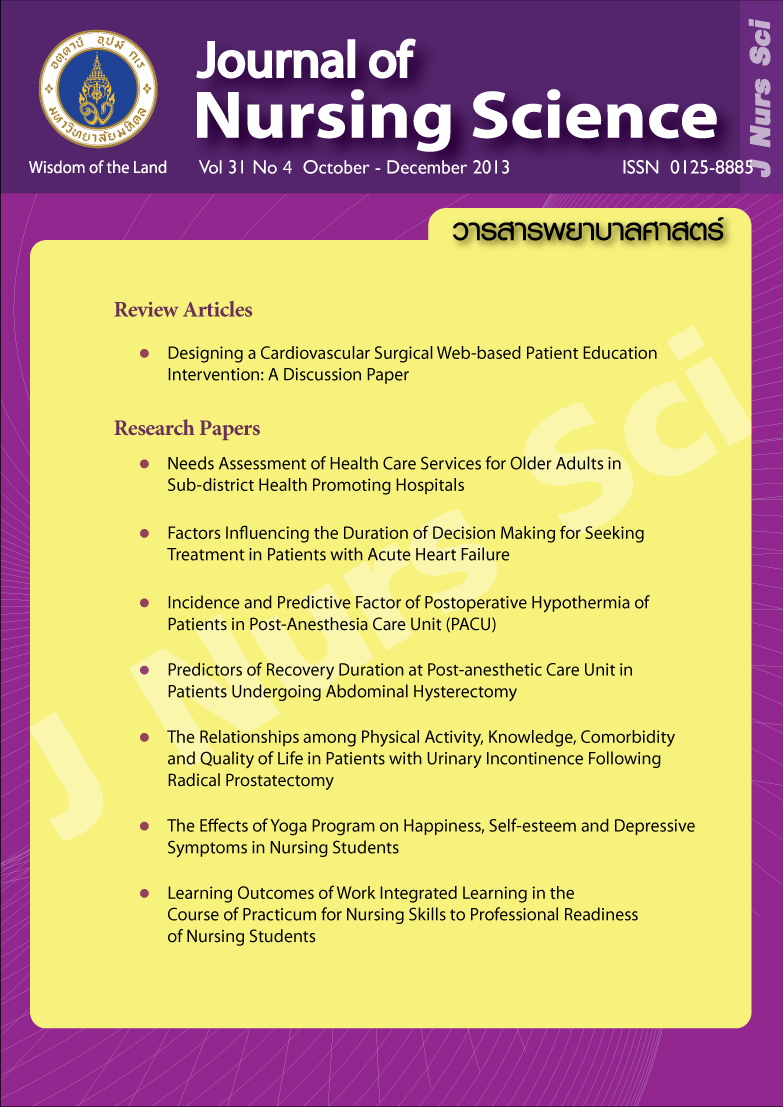The Effects of Yoga Program on Happiness, Self-esteem and Depressive Symptoms in Nursing Students
Main Article Content
Abstract
Purpose: This research aimed to investigate the effects of the yoga program on happiness, selfesteem and depressive symptoms in nursing students.
Design: A quasi- experimental research, pre-test post-test control group design.
Methods: The study participants were 54 nursing students with 27 persons in each experimental and control group. The experimental group received the yoga program comprising 25 basic yoga poses for 8 weeks delivered twice a week. In addition, the yoga guide books were disseminated to all participants to practice by themselves. The control group did not practice yoga and lived normally. The study instruments consisted of the student information questionnaire; Thai New Happiness Indicator, Rosenberg’s Self-Esteem Scale, and the Center for Epidemiologic Studies-Depression Scale. The experimental and control groups were administered a packet of questionnaires before and after the yoga program. Data were analyzed by descriptive statistics, analysis of covariance (ANCOVA) with pre-test scores as covariate, and paired t-test.
Main findings: The happiness and self-esteem mean scores of the experimental group were significantly higher than those of the control group (p < .05). The depression mean score of the experimental group was not significantly lower than that of the control group (p > .05).
Conclusion and recommendations: The findings support the effectiveness of the yoga program on enhancing happiness and self-esteem in nursing students. Therefore, the yoga program should be implemented with nursing students to be a choice of their holistic health care.
ผลของโปรแกรมการฝึกโยคะต่อความสุข การเห็นคุณค่าในตนเอง และอาการซึมเศร้าในนักศึกษาพยาบาล
กลิ่นชบา สุวรรณรงค์, พวงเพชร เกษรสมุทร, นภวัลย์ กัมพลาศิริ, วรรณา คงสุริยะนาวิน, กาญจนา ครองธรรมชาติ
บทคัดย่อ
วัตถุประสงค์: เพื่อศึกษาผลของโปรแกรมการฝึกโยคะต่อความสุข การเห็นคุณค่าในตนเอง และอาการซึมเศร้าในนักศึกษาพยาบาล
รูปแบบการวิจัย: เป็นการวิจัยกึ่งทดลองแบบสองกลุ่ม วัดก่อนและหลังการทดลอง
วิธีดำเนินงานวิจัย: เลือกกลุ่มตัวอย่างที่มีคุณสมบัติตามเกณฑ์ที่กำหนดจำนวน 54 คน แบ่งเป็นกลุ่มทดลองและกลุ่มควบคุม กลุ่มละ 27 คน กลุ่มทดลองได้รับการฝึกโยคะอาสนะพื้นฐานจำนวน 25 ท่า ในระยะเวลา 8 สัปดาห์ๆ ละ 2 ครั้ง และได้รับคู่มือการฝึกโยคะเพื่อนำไปฝึกปฏิบัติเพิ่มเติม กลุ่มควบคุมไม่ได้รับการฝึกโยคะและดำเนินชีวิตตามปกติ เครื่องมือที่ใช้ในการเก็บรวบรวมข้อมูลประกอบด้วย แบบสอบถามข้อมูลส่วนบุคคล ดัชนีชี้วัดความสุขคนไทยฉบับสั้นของกรมสุขภาพจิต แบบสอบถามการเห็นคุณค่าในตัวเองของโรเซนเบอร์ก และแบบคัดกรองภาวะซึมเศร้าในวัยรุ่น กลุ่มตัวอย่างได้รับการประเมินก่อนและหลังการทดลอง วิเคราะห์ข้อมูลโดยใช้สถิติพรรณนา สถิติวิเคราะห์ความแปรปรวนร่วมโดยให้คะแนนก่อนการทดลองเป็นตัวแปรร่วม และการทดสอบที
ผลการวิจัย: คะแนนเฉลี่ยความสุขและการเห็นคุณค่าในตนเองของกลุ่มทดลองสูงกว่ากลุ่มควบคุมอย่างมีนัยสำคัญทางสถิติ (p < .05) คะแนนเฉลี่ยอาการซึมเศร้าของกลุ่มทดลองต่ำกว่ากลุ่มควบคุมอย่างไม่มีนัยสำคัญทางสถิติ (p > .05)
สรุปและข้อเสนอแนะ: โปรแกรมการฝึกโยคะมีประสิทธิภาพในการเพิ่มความสุขและการเห็นคุณค่าในตนเองของนักศึกษาพยาบาล จึงควรนำโปรแกรมการฝึกโยคะไปใช้กับนักศึกษาพยาบาลในสถาบันการศึกษาต่างๆ เพื่อเป็นทางเลือกหนึ่งในการดูแลสุขภาพแบบองค์รวม
คำสำคัญ: โยคะ ความสุข การเห็นคุณค่าในตนเอง อาการซึมเศร้า นักศึกษาพยาบาล
Article Details
Copyright Notice: Nursing Science Journal of Thailand has exclusive rights to publish and distribute the manuscript and all contents therein. Without the journal’s permission, the dissemination of the manuscript in another journal or online, and the reproduction of the manuscript for non-educational purpose are prohibited.

Disclaimer: The opinion expressed and figures provided in this journal, NSJT, are the sole responsibility of the authors. The editorial board bears no responsibility in this regard.


